
Why 'The Batman' Is The Best Live-Action Movie About Batman
Matt Reeves' new adaptation focuses on his hero's psychology and motivation.
[Disclosure: As a WarnerMedia employee, I work for the same company that makes Batman, so feel free to take my opinions here with a grain of salt.]
This article contains spoilers for The Batman.
In an age where we’re inundated with superhero movies, it may seem silly that anyone even bothered to make a new Batman movie. Of course, from a financial perspective, it makes sense since Batman prints money, but he’s never been far from theater screens. While his last standalone effort was 2012’s The Dark Knight Rises, he was still kicking around in Zack Snyder’s version of the character, played by Ben Affleck, in Batman v. Superman: Dawn of Justice and Justice League as well as a brief cameo in Suicide Squad. At one point, Affleck was supposed to direct a solo film focused on the character, but Affleck decided he didn’t really want to commit himself to the project, and so it moved over to director Matt Reeves (Dawn of the Planet of the Apes and War for the Planet of the Apes).
Batman is an interesting character because on the one hand, he’s quite fungible in the way that you have to be to remain popular for over 75 years. On the other hand, despite the numerous film adaptations, it’s been tough for filmmakers to nail down what makes the character special and why he is both deeply damaged as well as heroic. For example, while in the early Batman comics he used a gun and killed people, those elements were eventually written out of his character, which makes sense. A person who witnessed their parents gunned down in front of them may be reluctant to use the instrument of their demise (it’s also just more narratively interesting if he can’t rely on firearms). On the other hand, you look at something like Frank Miller’s The Dark Knight Returns and while Batman rejects guns, he’s also very much a fascist in the way that superheroes tend to be.1
But when it comes to the Batman movies, filmmakers have had a tough time nailing the character down. If you go back to 1966 (I know there are two serial films in the 1940s but I haven’t seen them), the Adam West version is incredibly fun, but it’s also very silly. It is camp, but also very much for children. The 1966 Batman movie has Batman running around trying to throw away a giant bomb. It’s cartoonish and lighthearted, and everyone was fine with that. There are also the two animated movies—Batman: Mask of the Phantasm and The LEGO Batman Movie—and they do a surprisingly good job of getting to the core of who Batman is, which is that Batman is lonely and cursed by the loss of his parents.
In Glen Weldon’s non-fiction critical analysis of Batman through the years, The Caped Crusade, Weldon argues the core aspect of Batman is “The Vow.” The Vow is Bruce Wayne as a child pledging that he will spend his life fighting criminals so that no one ever has to suffer the pain he is suffering. However, as the two animated movies point out, this has left Bruce in a place where human connections are incredibly tough. Essentially, because he lost his family as a child, he has ironically given up the potential of a new family. Here’s a powerful clip from Mask of the Phantasm where Bruce begs at his parents’ graves to be released from the vow he made:
The LEGO Batman Movie approaches this idea in a more comedic fashion, but the result is the same: the only way for Batman to grow as a person and have real dramatic stakes is to find a new family while accepting the limitations of his crusade.
Up until Matt Reeves’ The Batman, all the live-action Batman movies missed this, and I’ll explain why.
Batman and Batman Returns
1989’s Batman was a major turning point in franchise filmmaking, but it’s surprisingly not really Batman’s film. It’s a Joker movie that happens to have Batman in it, and Tim Burton and Michael Keaton’s conclusion on Batman is that he’s nuts. They don’t think that makes him bad, but they clearly see someone who dresses up as a giant Bat to fight crime as a huge weirdo at best, and the whole film is pitched accordingly. You couldn’t create Gotham as “real” because it’s simply too silly. In this way, Burton’s movies have a kinship with the 1966 Batman but they’re rendered in gothic art deco rather than pastels.
Batman Returns (a far superior film) is more Batman’s movie than the previous one, but he still has to share a lot of time with Catwoman (Michelle Pfeiffer) and The Penguin (Danny DeVito), but the introduction of Catwoman helps better define how Burton sees Batman. Essentially, he sees them as damaged individuals whose true selves are their costumed personas (hence why at the costume ball Bruce and Selina are the only ones not wearing masks—their maskless faces are the masks). But at the end of the day, Batman is still some goth weirdo who could use some companionship and doesn’t mind killing The Penguin’s goons (Batman doesn’t exactly have a clear morality in these movies; he doesn’t want Selina to murder Max Shreck (Christopher Walken), but he also has no problem just murdering henchmen).
Batman Forever and Batman & Robin
The whole point of these movies is to drive Batman back to his campy image, but it’s a struggle to make that happen in the 1990s. Essentially, we were all too hip to go on the ride, and while the movies are certainly colorful, they don’t have much interest in Batman beyond being a fetish object. There are some hints of deeper psychology in Batman Forever where Bruce talks about his nightmares to love interest Dr. Chase Meridian (Nicole Kidman), and in Batman & Robin there are some bungled plot threads about Batman realizing the importance of family vis-a-vis his relationship to Robin (Chris O’Donnell) and his concern about Alfred (Michael Gough) dying, but Batman & Robin is so sloppily slapped together that nothing in it really works beyond being aggressively goofy.
People can talk about disliking Val Kilmer or George Clooney as Batman, but neither actor had much to work with here. In the documentary Val, Kilmer points out that while Batman seems like a dream role, you’re really just playing an action figure. He couldn’t hear the other actors when he was in the suit or even turn his head (the turning-the-head thing for all the previous Batmen became such a joke that they referenced it in The Dark Knight when Bruce (Christian Bale) comes to Lucius (Morgan Freeman) to upgrade his suit). As for Clooney, his Batman barely factors into the whole movie. Even if Clooney wasn’t wearing a dismissive smirk the whole time (and really, who can blame him for not taking it seriously when the whole tone of the movie is about how silly this all is), there’d be nothing for him to do.
The Dark Knight Trilogy
I think Christopher Nolan approaches Batman as a problem to be solved, which is how Nolan approaches most things. My dude is never happier than when he’s in exposition mode, and so it makes sense that his entire first Batman movie is an origin story that has to explain everything! And in some ways, it works. Using Bruce’s fear at the opera to drive his parents out to the alley where they were gunned down is genius storytelling because in the comics, the reason Bruce dresses up like a Bat is to strike fear into the hearts of his enemies. Fear is a core concept of the character, and Nolan and David S. Goyer’s script makes that a central plot point for the entire film.
But when you pull back, it’s bizarre how much the movie explains and yet Nolan, who never seems completely comfortable with human emotions (Interstellar is his most unabashedly emotional movie and it still contains a scene where Anne Hathaway’s character explains how love works), has trouble finding Batman’s emotional core. It’s a movie that explains how Bruce Wayne trained to be Batman, how there’s a radio receiver in the cowl’s ears, how they would put the cowl together without it being traced back to Bruce Wayne, where he would find his own personal tank, and so on and so on. For Nolan, in order to make Batman “real” you have to explain where he comes from, and to be fair, in 2005, no one had really done that legwork on the big screen. It was an exciting relaunch despite some glaring flaws (I can’t get over the third act; I wish I could, but I can’t).
But for Nolan, Batman isn’t so much of a character study as a job. If Tim Burton’s Batman is “crazy” then Nolan swings the pendulum too far in the other direction in Batman Begins by trying to argue that Batman is a very rational side-hustle. Even the traumatic core—Bruce’s parents were murdered in front of him—now serves as a rational explanation for action without really diving into the emotions that Batman may possess. He still cares about Alfred (Michael Caine) and Rachel (Katie Holmes, Maggie Gyllenhaal) and Gotham, but it’s all based in rational argument. When Ra’s al Ghul (Liam Neeson) comes to Gotham, Bruce basically pleads, “Look, you don’t have to flood the city with fear gas and make its residents tear each other apart. I’m dressing up as a giant Bat every night and making some pretty good progress.”
The Dark Knight is my favorite Batman movie even if I don’t think it’s really a movie about Batman. It’s a film I can pop on and be entertained by it from start to finish, but it’s really an ensemble piece about the intersecting battles between Joker (Heath Ledger), Gordon (Gary Oldman), and Harvey Dent (Aaron Eckhart) with Batman in the middle of it all. The film is a terrific parable about the War on Terror and how our desire for security and comforting lies leads to less safety for everyone. But as a story about Batman, again it’s about how this is kind of a nice little side-hustle for Bruce Wayne. He was willing to give up being Batman (even if Rachel didn’t believe it), and his ultimate conclusion is that he needs to be Batman because it’s the lie everyone needs to believe in. Essentially, the conclusion of The Dark Knight is external; Batman is perceived by Gotham at large as a murderer, but he’s a fungible symbol. “I’m whatever Gotham needs me to be.”
The Dark Knight Rises is supposed to provide a redemption story of sorts where after eight years in hiding, Batman “Rises” to take on Bane (Tom Hardy) and save Gotham again. The Dark Knight Rises has a lot of problems, but the one I keep coming back to is Nolan’s desire to retrofit Batman into an egalitarian concept after spending an entire movie (Batman Begins) explaining that it’s incredibly tough to be Batman and not anyone can do it because it requires both extreme physical training and massive wealth. But again, the concept that comes out of The Dark Knight Rises is that Bruce Wayne didn’t really want to keep being Batman not because of the psychological toll, but because it was a gig he was no longer interested in doing. Concepts of found family and childhood guilt just aren’t major factors in what Nolan clearly saw as a series of crime thrillers that happen to have some colorful comic book characters.
Batman v Superman: Dawn of Justice
I hesitated to even include this one because it’s also kind of Superman’s movie, but I’d be remiss if we didn’t talk about what Zack Snyder wanted to do with the character. In a vacuum, I kind of like Snyder’s take. He wanted to take a Batman that was stripped of any idealism he might have had, and then over the course of the franchise, show how Batman reforged his faith in humanity by seeing the sacrifices of his allies. It’s not the worst take in the world, but the execution of it, particularly in Batman v Superman, doesn’t really work for me.
I think Affleck does a solid job as Batman, but essentially Batman’s motivation is what Lex Luthor (when he’s written well) does in the comics, which is that Superman is too powerful to simply be left to his own devices, and someone has to stop him. Batman has to start out in such a hideously dark place that it pretty much removes all heroism from him in order to make him feel brash and paranoid. Again, maybe that works better if you get to the end of whatever Snyder had planned in the long-run, but that’s also one of the big strikes against franchise filmmaking. If you have to go, “Oh, it’s gonna make sense three movies from now,” then you’re capitulating on the strength of the story you’re telling right now.
Again, I’m not dismissing Snyder outright, but I feel like his consistent need to deconstruct superheroes ends up missing their construction so that we’re constantly left with these feet-of-clay archetypes that may be different from their predecessors, but I’m not sure they’re necessarily better or more interesting.
The Batman
So now we finally come to the new Batman. As you’ve probably read by now, The Batman is very dark. The New Batman is very emo. In this world, Bruce Wayne has been Batman for about two years, and he knows he’s not making a difference. He goes home at night and writes in a journal while listening to Nirvana. He is a sad boy.
In lesser hands, this depiction would probably be rendered comical in the “Darkness! No Parents!” mold of LEGO Batman, but Reeves and Pattinson make it work because the whole point of The Batman is a psychological study that’s primarily concerned about why Batman is doing this. And the answer at the beginning of the film is that he doesn’t really know why. He goes out into the night and beats up random thugs, and it only provides brief satisfaction. Batman may not be the “bad” guy, but it’s hard to say he’s doing anything good.
The film’s entire transformational arc for Batman (and this film is about Batman, not Bruce, who barely shows up in the film; even when he does, his haunted look lets you know that Batman is the “real” him) is about learning that his identity is a lie and that it’s only through connecting with people can he hope to affect any real change. It’s a movie about how “The Vow” itself is founded on a lie and that Batman will need other people in his life if he’s going to be a better person and follow through on his mission to save Gotham.
Let’s start with The Vow, which is one of the film’s more ingenious twists. Reeves, blessedly, does not show the Waynes getting gunned down in an alley yet again. Instead, in the course of Batman’s investigation, he learns that his mother was in and out of psychiatric hospitals, and his father, Robert, in his desperation, put himself in debt to gangster Carmine Falcone (John Turturro), who bumped off the reporter that threatened to expose Thomas Wayne’s secret. Alfred (Andy Serkis) tries to put it in context that Robert Wayne was a good man who made a bad mistake, but it doesn’t matter because it completely reframes The Vow. Bruce worked under the assumption that his parents were innocents who were gunned down in an alley; he learns that their murder was possibly the consequences of his own father’s immoral actions, so where does that leave Bruce? How do you fight crime when crime is part of your legacy?
Batman’s redemption, as the film shows, is in how he learns to work with other people. The bonds he forges with Gordon (Jeffrey Wright) and Selina (Zoë Kravitz), and repairs with Alfred (who he realizes is the most important person to him only when it looks like Alfred might die) are what restore humanity to Batman. Without those bonds, Riddler (Paul Dano) isn’t off-base in thinking that he has a kindred spirit in Batman. He doesn’t know Batman’s true identity, but the film recognizes that from an outsider’s perspective, a guy who goes out into the night to beat up criminals would have an ally in someone who wants to punish the corrupt leaders that have kept Gotham a cesspool.
For some, Batman’s transformation from “vengeance” to “hope” may not be enough, but I think it’s a pretty rewarding character arc if, for no other reason, then other movies have struggled to give him one. Pattinson may see Batman as “crazy and perverse”, but the way he plays the character is like a man who has been traumatized. The sadness that plays through ties nicely with where the animated incarnations were willing to go with the character. While Batman has grieved in previous movies, too often the depictions simply went towards raw, unfiltered anger. In The Batman, we see the sadness of a character shackled by a promise he doesn’t fully understand to quest he doesn’t know how to fulfill.
I love superheroes, but they tend to be benevolent dictators. While popular narratives show them as kind of ultra-firefighters—people who come in to save people from a disaster—ultimately, they’re people who have more power than the rest of us and unilaterally can use it in ways they see fit. Their heroism is glorified through violence as opposed to starting soup kitchens or nursing the wounded. That being said, I don’t think people flock to superhero stories because they’re secretively craving fascist narratives. I think people like simple, spectacle-driven stories where good guys win and bad guys lose. They’re fantasies and most people accept them as such.


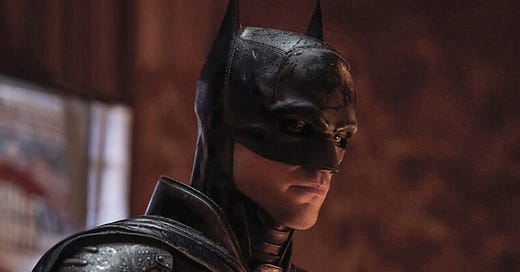


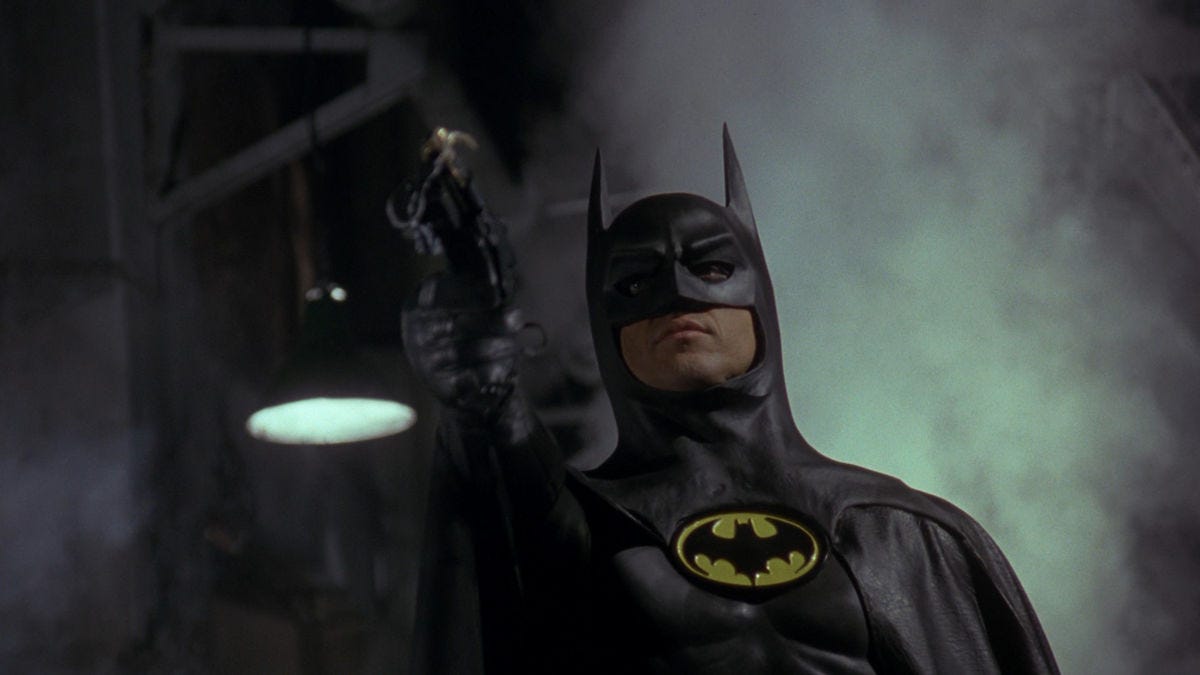
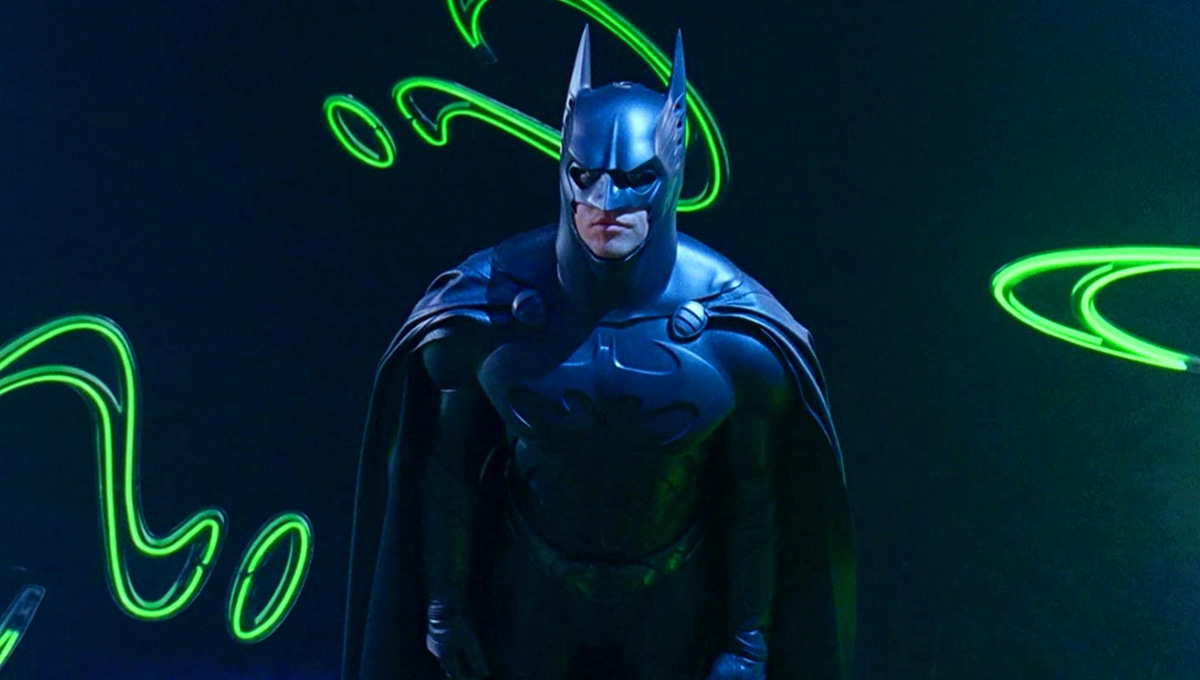
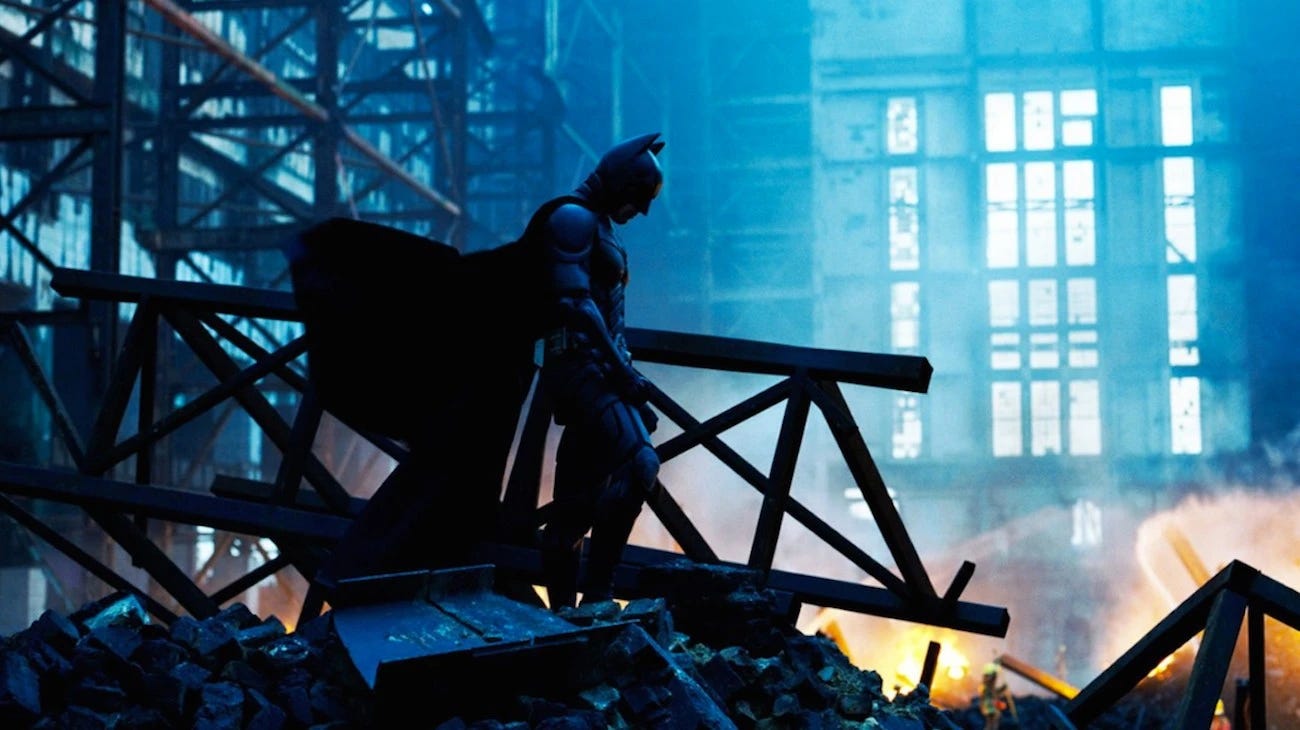

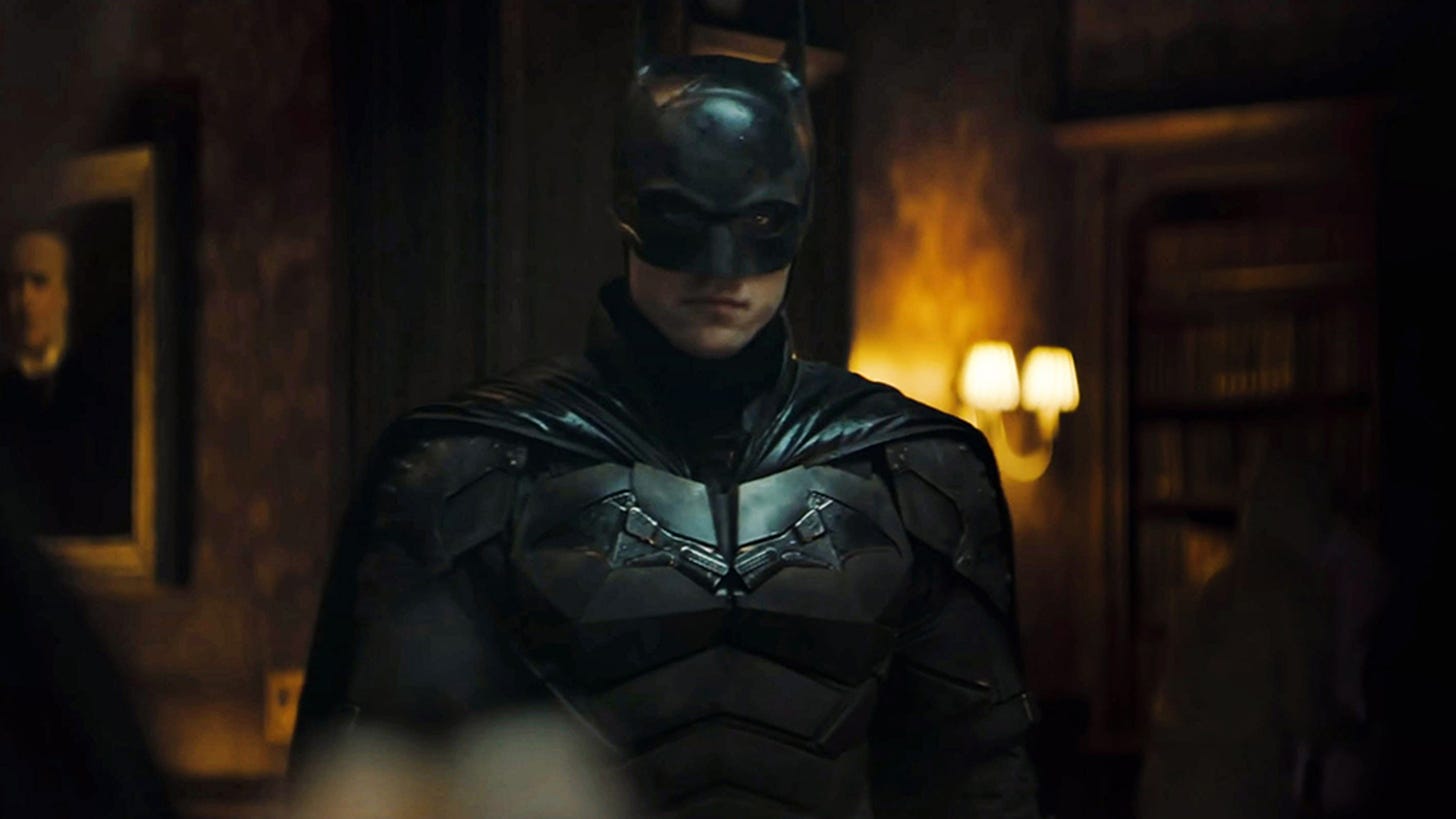
Very thorough analysis of Batman through his different incarnations.